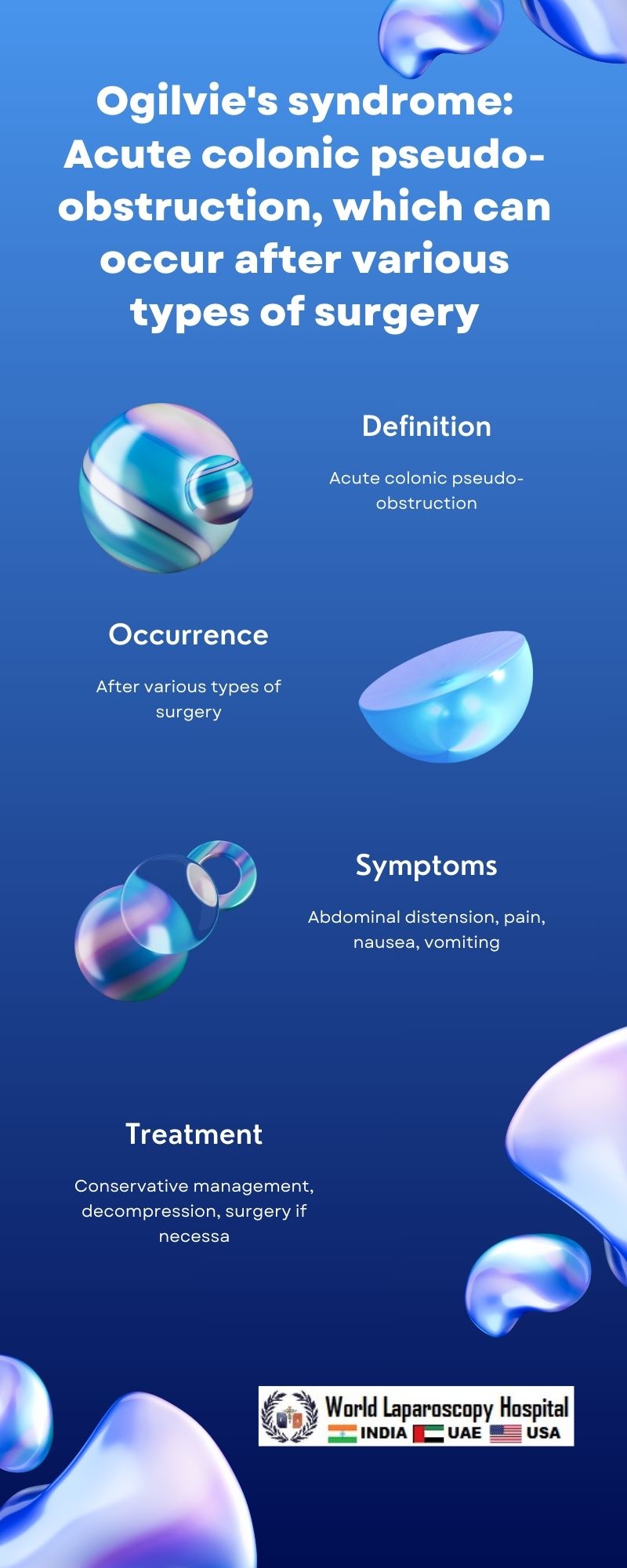Ogilvie's syndrome: Acute colonic pseudo-obstruction, which can occur after various types of surgery
Ogilvie's syndrome: Acute colonic pseudo-obstruction, which can occur after various types of surgery
Introduction
Ogilvie's syndrome, also known as acute colonic pseudo-obstruction (ACPO), is a rare but potentially serious condition characterized by acute colonic dilation without an underlying mechanical obstruction. It was first described by Sir William Heneage Ogilvie in 1948. This condition typically occurs after surgery or trauma, although it can also occur spontaneously in some cases.

Pathophysiology
The exact cause of Ogilvie's syndrome is not fully understood, but it is believed to result from a combination of factors including sympathetic inhibition, parasympathetic stimulation, and impaired colonic motility. The condition is thought to be triggered by a variety of factors, including surgery, trauma, infections, medications, electrolyte imbalances, and underlying medical conditions.
Clinical Presentation
Patients with Ogilvie's syndrome typically present with abdominal distension, pain, and tenderness. They may also experience nausea, vomiting, constipation, and a lack of bowel movements. In severe cases, patients may develop signs of colonic perforation, such as fever, tachycardia, and peritonitis.
Diagnosis
The diagnosis of Ogilvie's syndrome is based on clinical findings and radiological imaging. Abdominal X-rays may show colonic dilation, while CT scans can help to rule out mechanical obstruction. A colonoscopy may also be performed to evaluate the colon and rule out other potential causes of obstruction.
Treatment
The goal of treatment for Ogilvie's syndrome is to decompress the colon and restore normal bowel function. This can often be achieved through conservative measures such as bowel rest, fluid resuscitation, and the use of medications to stimulate colonic motility. In some cases, more aggressive interventions may be required, including colonoscopic decompression or surgical intervention.
Surgical Considerations
Surgery is typically reserved for cases where conservative measures have failed or when there are signs of colonic perforation. The most common surgical procedure for Ogilvie's syndrome is a decompressive colonoscopy, where a colonoscope is used to decompress the colon by removing the trapped gas and fecal matter. In some cases, a surgical procedure known as a cecostomy may be performed, where a tube is inserted into the cecum to decompress the colon.
Prognosis
The prognosis for patients with Ogilvie's syndrome depends on the underlying cause, the severity of the condition, and the promptness of treatment. With appropriate treatment, most patients recover fully without long-term complications. However, in severe cases, complications such as colonic perforation and sepsis can occur, which can be life-threatening.
Conclusion
Ogilvie's syndrome is a rare but potentially serious condition that can occur after various types of surgery. It is characterized by acute colonic dilation without an underlying mechanical obstruction. Prompt recognition and treatment are essential to prevent complications and improve outcomes. Further research is needed to better understand the underlying mechanisms of this condition and to develop more effective treatments.
Introduction
Ogilvie's syndrome, also known as acute colonic pseudo-obstruction (ACPO), is a rare but potentially serious condition characterized by acute colonic dilation without an underlying mechanical obstruction. It was first described by Sir William Heneage Ogilvie in 1948. This condition typically occurs after surgery or trauma, although it can also occur spontaneously in some cases.

Pathophysiology
The exact cause of Ogilvie's syndrome is not fully understood, but it is believed to result from a combination of factors including sympathetic inhibition, parasympathetic stimulation, and impaired colonic motility. The condition is thought to be triggered by a variety of factors, including surgery, trauma, infections, medications, electrolyte imbalances, and underlying medical conditions.
Clinical Presentation
Patients with Ogilvie's syndrome typically present with abdominal distension, pain, and tenderness. They may also experience nausea, vomiting, constipation, and a lack of bowel movements. In severe cases, patients may develop signs of colonic perforation, such as fever, tachycardia, and peritonitis.
Diagnosis
The diagnosis of Ogilvie's syndrome is based on clinical findings and radiological imaging. Abdominal X-rays may show colonic dilation, while CT scans can help to rule out mechanical obstruction. A colonoscopy may also be performed to evaluate the colon and rule out other potential causes of obstruction.
Treatment
The goal of treatment for Ogilvie's syndrome is to decompress the colon and restore normal bowel function. This can often be achieved through conservative measures such as bowel rest, fluid resuscitation, and the use of medications to stimulate colonic motility. In some cases, more aggressive interventions may be required, including colonoscopic decompression or surgical intervention.
Surgical Considerations
Surgery is typically reserved for cases where conservative measures have failed or when there are signs of colonic perforation. The most common surgical procedure for Ogilvie's syndrome is a decompressive colonoscopy, where a colonoscope is used to decompress the colon by removing the trapped gas and fecal matter. In some cases, a surgical procedure known as a cecostomy may be performed, where a tube is inserted into the cecum to decompress the colon.
Prognosis
The prognosis for patients with Ogilvie's syndrome depends on the underlying cause, the severity of the condition, and the promptness of treatment. With appropriate treatment, most patients recover fully without long-term complications. However, in severe cases, complications such as colonic perforation and sepsis can occur, which can be life-threatening.
Conclusion
Ogilvie's syndrome is a rare but potentially serious condition that can occur after various types of surgery. It is characterized by acute colonic dilation without an underlying mechanical obstruction. Prompt recognition and treatment are essential to prevent complications and improve outcomes. Further research is needed to better understand the underlying mechanisms of this condition and to develop more effective treatments.
1 COMMENTS
Dr. Randi Gleason
#1
Feb 20th, 2024 7:42 pm
Ogilvie's syndrome, though rare, poses serious risks post-surgery with acute colonic dilation. Early recognition and intervention are vital for averting complications and enhancing outcomes. Continued research is crucial for refining treatments and unraveling its underlying mechanisms.
| Older Post | Home | Newer Post |



